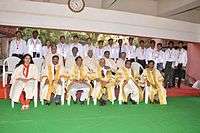Man Mohan Sharma
Man Mohan Sharma FREng[1] (born May 1, 1937 in Jodhpur, Rajasthan) is an Indian chemical engineer. He was educated at Jodhpur, Mumbai and Cambridge. At the age of 27 years, he was appointed Professor of Chemical Engineering in the Institute of Chemical Technology (UDCT), Mumbai.[2] He later went on to become the Director of Institute of Chemical Technology (ICT/ UDCT/ UICT), the first chemical engineering professor to do so from ICT.
In 1990, he became the first Indian engineer to be elected as a Fellow of Royal Society, UK. He was awarded the Padma Bhushan (1987) and the Padma Vibhushan (2001) by the President of India.[3] he has also been awarded the Leverhulme Medal of the Royal Society, the S.S. Bhatnagar Prize in Engineering Sciences (1973), FICCI Award (1981), the Vishwakarma medal of the Indian National Science Academy (1985), G.M. Modi Award (1991), Meghnad Saha Medal (1994), and an honorary Doctor of Science degree from Indian Institute of Technology, Delhi (2001).[2]



Education
Man Mohan Sharma obtained Bachelor of Chemical Engineering (1958) from UDCT (ICT) and subsequently MSc (Tech) in 1960. He obtained PhD (Chemical Engineering) (1964) at Cambridge University with PV Danckwerts. In 1964, he returned to India as Professor at the University of Bombay, and later became Director of the University Department of Chemical Technology (UDCT), now ICT (Institute of Chemical Technology — A Deemed University). He remained as Professor for 33 years at UDCT, along with 8 years as Director of this instititute. He has been honored by several universities including IITs by honorary doctorates.
Academic career
Sharma made contributions to chemical engineering science and technology. His studies on Bronsted based catalysis in CO2 hydration (published in the Transactions of Faraday Society) and subsequently kinetics of COS absorption in aqueous amines and alkanolamines brought out linear free energy relationship between CO2 and COS absorption in solutions of amines and alkanolamines. He has contributed extensively on the role of microphases in multiple reactions which he pioneered. He also became an independent Editor of Chemical Engineering Science at a young age. He taught different subjects in chemical engineering and encouraged his doctoral students, from the very beginning, to publish independently their work in renowned journals.
Under his stewardship, UICT got autonomy of UGC. He brought about all-around improvement in all the departments of the Institute leading to exceptionally high number of PhDs each year based on the number of faculty members. He served in Petroleum and Natural Gas as Chairman of the SAC and in the SAC to Cabinet and PM. He was INSA Council Member (1980-82) and Vice President (1987-88).
Awards
Professor Sharma is a recipient of a number of prestigious academic honours and awards including the 1977 Moulton Medal of the Institution of Chemical Engineers,[4] and is himself commemorated in the M M Sharma Medal awarded by the same institution for outstanding research contributions.[5]
He won the Leverhulme Medal of the Royal Society for "for his work on the dynamics of multi-phase chemical reactions in industrial processes". He was awarded the Padma Vibhushan (2001), and Padma Bhushan (1987) by the President of India. He was INSA President (1989-90). He is a Fellow of the Indian Academy of Sciences, Bangalore, Honorary Fellow of the National Academy of Sciences (India), Allahabad, Fellow of the Royal Society, London. Subsequently he was elected Honorary Fellow by the Royal Academy of Engineering[6] and is Foreign Associate of the US National Academy of Engineering.
References
- ↑ "List of Fellows".
- 1 2 "Prof. Man Mohan Sharma". Chemical & Materials Eng., The University of Auckland. Archived from the original on January 12, 2009. Retrieved 22 January 2010.
- ↑ "Padma Awards" (PDF). Ministry of Home Affairs, Government of India. 2015. Retrieved July 21, 2015.
- ↑ "Moulton medal senior winners".
- ↑ "M M Sharma medal".
- ↑ "List of Fellows".